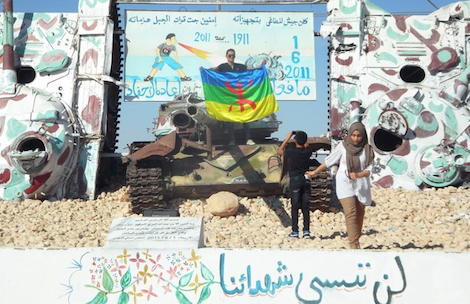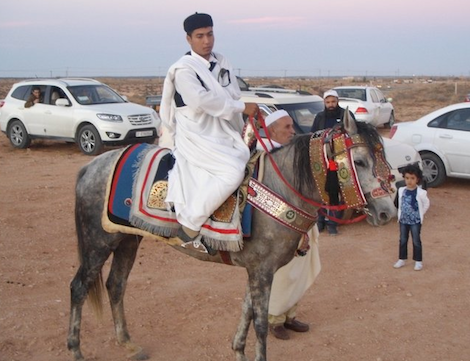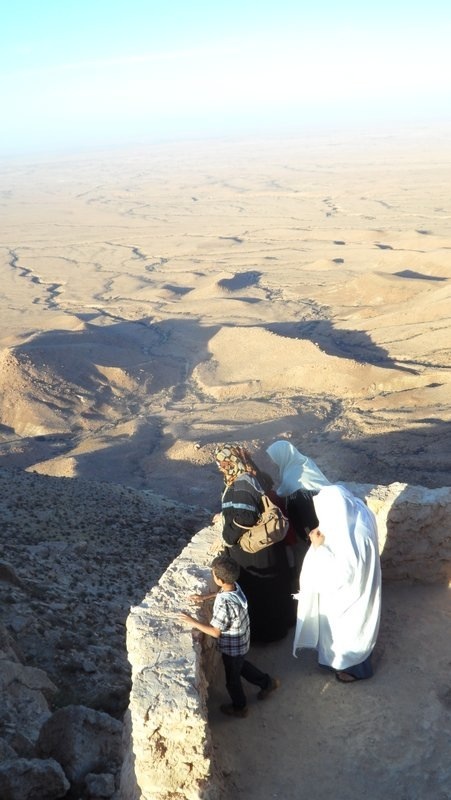By Valerie Stocker.

Jadu, 11 November:
Tafsout is Tamazight for “spring”. Not a reference to the so-called Arab Spring, for once, but to . . .[restrict]the Berber tradition of holding festivals in springtime. Pursuing this tradition – albeit a bit ahead of time – local groups together with the Ministry of Culture organised a festival of Amazigh culture in the Nafusa Mountains, whose main events took place in the town of Jadu from 7 to 9 November 2012.
Speaking at the sidelines of the festival, Congress President Mohammed Magarief expressed his support for the constitutional recognition of the Berber language.
It is impossible to know how many people attended the celebrations, but judging by the crowds who were wandering about on the maintain plateau on which Jadu and surrounding towns are located on Friday afternoon, and according to local residents, the overall number of visitors could have reached 8,000. Prominent visitors included several government members, as well as the Ambassadors of Britain, Italy, the United States and Turkey, amongst other diplomats.
Driving up the sloped mountain road, songs in Tamazight played on Nafusa radio stations were a perfect prelude to the cultural heritage presented and celebrated at the festival. The organisers of the event had chosen a variety of means to present this heritage to a wider public, including conferences, exhibitions, theatre, a book fair and a horse riding show.
As the festival’s main venue, the old town of Jadu hosted an open-air display of Libyan Berber folklore and handicraft, including a wall designed to represent traditional houses of Ghadames with their typical red paint and colourful decoration on white walls, as well as a photo exhibition by a local charity for the disabled.
The mood on the last day of the event was festive, with children running around and taking photos while the adults sat inside a large tent drinking tea and tasting local specialties such as bsisa jabaliya. Locals and exhibitors were enthusiastically showing the guests around and explaining their respective customs and traditions in every detail.
Nearby Termisa, which features one of Libya’s most beautiful ancient fortified villages perched on a steep cliff overlooking the wide plain far below, was equally crowded with visitors, most of them in traditional dress for the occasion. Libya TV, Al-Riyadhiya and other national media were there to cover the event. It was the late Friday afternoon horse riding show a few kilometres outside Jadu that probably attracted the largest number of visitors at once, who – once the sun had set – made their way back in a seemingly never-ending line of cars winding their way through the hills. “The Gargaresh of Jebel Nafusa”, a bystander said jokingly.

During three consecutive evenings, speeches, conferences, concerts and a play in Tamazight language were performed on a stage set up on the central square of Jadu’s old town. Reflecting the transnational nature of the Amazigh community, which stretches across the Maghreb from Libya to Mauritania and parts of the Sahel zone, speakers included Khaled Zirari from Morocco, vice-president of the World Amazigh Congress and other Berber activists from abroad. One discussion focused on local celebrity Said Al-Mahrouq, a dissident poet and songwriter from Jadu who in 1979 narrowly survived a car accident – which activists say was in fact an assassination attempt in disguise – and who died of the consequences a few years later.
Many Libyans from all over the country attended the festival in order to celebrate – but also to learn about – their country’s Amazigh heritage. Speaking to the Libya Herald, Nir, a long-time defender of the Berber cause sees it as a positive sign for national unity, emphasising that many of those who attended the festival had no – or little – prior knowledge of Berber culture.
On the other hand, he and many others are at best cautiously optimistic about the future. “It feels great to see all this Amazigh culture openly displayed and celebrated, but who knows whether we will still be able to do so in a few years time”, worries Nir. Having seen their cultural rights restricted for so long – in addition to political rights denied to all citizens – Libya’s Imazighen know that change will not result from the revolution alone and that their struggle has only just begun.
For the organising committee from Jadu, the festival was thus not only about opening a window to the outside world and bringing Libyans closer together, but also a step forward in a long process of political assertion of the Libyan Berber community. Activists like Fathi Yousef, one of the organisers and also a member of the World Amazigh Congress, were long-time opponents of the toppled regime.
Qaddafi held a particular grudge against Berber activists whom he saw as “agents of imperialism” – a threat to national cohesion and to his own simplistic representation according to which all Libyans were Arab and the Imazighen “no longer existed”.
Under his authoritarian rule, Amazigh culture was not be mentioned in school textbooks or officially studied by Libyan researchers, Tamazight was not taught and children could not be given Amazigh names. Those who nevertheless promoted Berber identity and rights would face persecution and sometimes death.
As much as many of them fought for Libya and national liberation during the 2011 revolution, Berber activists now think it is time to fight for their particular cause, which is to be recognised as an indigenous Libyan community whose ethnic origins are not Arab and whose native language is not Arabic, as well as to see Tamazight included in Libya’s new constitution as the country’s second official language.
Taking up these long-standing griefs and demands, Congress President Mohammed Magarief held an emotional speech on Friday evening in Jadu, in which he said that in his view “constitutional recognition of more than one language in Libya constitutes no harm whatsoever and does not infringe on national unity” and that “the future constitution should reflect all strands and components of Libyan society, in order to fulfil hopes and aspirations of all Libyans”.

He harshly criticised “those who justify rejection and exclusion of our Amazigh brothers”, reminding them that “for more than 14 centuries Islam has been teaching that we all came from Adam, and Adam came from dust” and that “there is no difference between Arabs and others, or between whites and blacks”.
In a statement to the press, Jadu politician Salem Qanan, who used to be deputy to former NTC Chairman Mustafa Abdul Jalil, praised Magarief for these encouraging words, adding, “we, Arabs and Imazighen, must work together for the future of this country and we must respect and cherish all this beautiful diversity that enriches Libya”.
Other former and current members of government paid their visit to Jadu during the festival, including outgoing Health Minister Fatima Hamroush. Although these visits and the fact that the festival was held under the auspices of the Ministry of Culture and Civil Society are seen as a positive sign for future Arab-Berber relations, it remains to be seen whether Libya’s Amazigh community will succeed in stepping out of the domain of folklore and tradition to officially enter the political scene. [/restrict]








